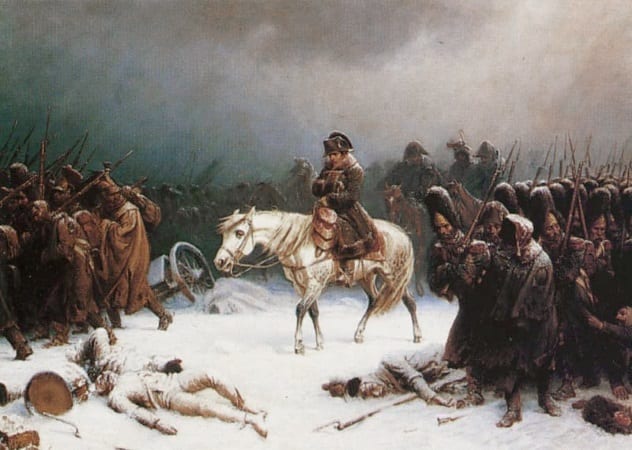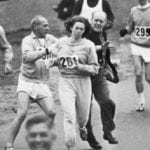 Animals
Animals  Animals
Animals  Movies and TV
Movies and TV 10 Box Office Bombs That We Should Have Predicted in 2025
 History
History 10 Extreme Laws That Tried to Engineer Society
 History
History 10 “Modern” Problems with Surprising Historical Analogs
 Health
Health 10 Everyday Activities That Secretly Alter Consciousness
 History
History Top 10 Historical Disasters Caused by Someone Calling in Sick
 Animals
Animals 10 New Shark Secrets That Recently Dropped
 Movies and TV
Movies and TV 10 Forgotten Realities of Early Live Television Broadcasts
 Technology
Technology 10 Stopgap Technologies That Became Industry Standards
 Weird Stuff
Weird Stuff 10 Wild Facts About Taxidermy That You Probably Didn’t Know
 Animals
Animals The Animal Kingdom’s 10 Greatest Dance Moves
 Movies and TV
Movies and TV 10 Box Office Bombs That We Should Have Predicted in 2025
 History
History 10 Extreme Laws That Tried to Engineer Society
Who's Behind Listverse?

Jamie Frater
Head Editor
Jamie founded Listverse due to an insatiable desire to share fascinating, obscure, and bizarre facts. He has been a guest speaker on numerous national radio and television stations and is a five time published author.
More About Us History
History 10 “Modern” Problems with Surprising Historical Analogs
 Health
Health 10 Everyday Activities That Secretly Alter Consciousness
 History
History Top 10 Historical Disasters Caused by Someone Calling in Sick
 Animals
Animals 10 New Shark Secrets That Recently Dropped
 Movies and TV
Movies and TV 10 Forgotten Realities of Early Live Television Broadcasts
 Technology
Technology 10 Stopgap Technologies That Became Industry Standards
 Weird Stuff
Weird Stuff 10 Wild Facts About Taxidermy That You Probably Didn’t Know
Top 10 Men Who Did Amazing Things (and Turned Out To Be Women)
History is full of amazing stories, adventures, and thousands of years of male dominance. As a result, women wishing to breach their normal positions in families and society have had to go to extraordinary lengths to make their mark.
Over the centuries, numerous women chose to pass themselves off as a man. This was often done to enter typically male-only fields, or because was required to serve in the military.
Whatever their individual reasons, these amazing women all did great things, and they did it all while the men around them thought they were just one of the guys.
10 Deborah Sampson
Deborah Sampson was born in Plympton, Massachusetts, in 1760. She was born to a prominent family but ended up in indentured service by the age of 10. Once this was completed, the self-educated descendent of prominent Pilgrims worked as a teacher and weaver.
In 1782, Sampson enlisted in the Fourth Massachusetts Regiment as a man named Robert Shurtleff. She was assigned to a Light Infantry company as a scout. Sampson led 30 infantrymen into combat and captured 15 men. At Yorktown, she dug trenches and fought with her unit.
Sampson hid her gender for almost two years, even going so far as to dig a pistol ball from her thigh to avoid the medical tent. Ultimately, her truth was discovered when an infection rendered her unconscious. She was given an honorable discharge and returned to Massachusetts, where she married and had three children.
Massachusetts gave Sampson a military pension, making her the only woman to receive a pension for service during the Revolutionary War. After her death, her husband petitioned the state for a continuation of her pension as her spouse. Massachusetts ultimately agreed, saying the conflict “furnished no other similar example of female heroism, fidelity, and courage.”
9 Christian “Kit” Cavanaugh
Christian Davies was born in Ireland in 1667, and she became the proprietor of a pub, which she inherited from her aunt. She married a man named Wichard Welsh, and the couple had two children, but when she was pregnant with their third child, Richard disappeared.
This happened in 1691, and it turned out that her husband was impressed into the British Army, which she learned when she received a letter explaining his situation. Intent on finding her husband, Christian gave her children to her mother, cut her hair, and dressed as a man. In 1693, she joined the British Army under the name Christopher Welch.
Christian fought at the Battle of Landen, where she was wounded and captured. She was returned via a prisoner exchange, and her disguise remained intact. She killed another soldier in a duel (over a woman), was discharged, and then reenlisted in the 2nd Royal North British Dragoons.
She fought in many campaigns and was finally discovered to be a woman when she was wounded. Once the news broke, her commander brought her husband back, reuniting the couple after a 13-year separation. She was given a pension and remained with her unit, which knew her as “Mother Ross.” When she passed in 1739, she was given full military honors.
8 Hannah Snell
Hanna Snell grew up in Worcester, England, in the 18th century. When she was old enough, she married a man and moved to London, where she gave birth to a daughter. Her husband left her while she was pregnant, and after the child died, Snell put on her brother-in-law’s clothes and assumed his name, James Gray.
She found that her husband was executed for murder, so she joined the 6th Regiment of Foot in the Duke of Cumberland’s army. She didn’t stay for long and ended up deserting to Portsmouth, where she joined the Royal Marines. In June of 1749, Snell was wounded 11 times, with one round hitting her groin. She asked a local woman to remove the bullet to avoid detection.
The following year, she revealed her sex to her fellow shipmates and petitioned the Duke for a military pension. This was granted despite her gender, and it was even increased years later. Snell sold her story to a London publisher, who printed her tale in The Female Soldier.
She took her story to the stage and gained some fame for her exploits. Eventually, she retired to East London, where she established a pub called The Widow in Masquerade. She remarried twice and had two children before passing at the age of 69 in 1792.
7 Jeanne Louise Antonini

Jeanne Louise Antonini was orphaned and alone by the age of ten. She disguised herself as a boy and joined the crew of the frigate La Cornélie. While serving aboard the ship, she maintained her guise as a boy. After a decade, she was wounded during the Napoleonic Wars.
Antonini was taken prisoner and was interned for 18 months until a treaty was signed between France and Britain. Once released, she returned to France, where she joined the French Army. Continuing to disguise herself as a male, she served in the French Army for 15 years, achieving the rank of Sergeant.
She was wounded numerous times throughout her service. Eventually, a severe injury to her head while serving in the French occupation of Portugal ended her military career. Throughout her 25+ years in the Navy and Army, her sex was never revealed.
After she left the Army, Antonini worked at a brick factory. When she was 70-years-old, she was honored with a Saint Helena Medal, the first French campaign medal established by Napoleon I. There is a street named in her honor in the French city of Nantes.
6 Charlotte D. Parkhurst
Charlotte D. Parkhurst was born in Vermont in 1812 to a small family, which got even smaller when both parents and her brother passed away. She was placed in an orphanage soon after birth, where she remained until she was 12. At that time, she ran away and started going by the name Charley.
Charley wound up in Rhode Island under the care of Ebenezer Balch, who raised him like a son. It was under Balch’s tutelage that Charley learned the art of stagecoach driving. By the time Parkhurst was 30, he made his way to California to find work during the Gold Rush, and shortly after arriving, Charlie lost an eye to a horse’s kick to the head.
Despite the injury (and the “One-Eyed Charley” nickname), Charley became one of the top drivers of his day. Stagecoach driving was a hazardous occupation, thanks to the lack of roads, the prevalence of bandits, and the harsh weather.
Hauling gold through “the great stage route” from San Hose to San Juan and Santa Cruz was harsh, but Charley became famous for his daring exploits and professionalism. He became known as the boss of the road.” He retired after a long career and passed away at the age of 67 in 1879. It was in death that Charley’s sex was finally discovered, having lived nearly his entire life as a man.
5 Marina The Monk
Marina was born to a wealthy Christian family in the 5th century. After her mother died, she was raised as a devout Christian by her father, who planned to marry her off when she was of age. When she learned of this, she offered an alternative: she would live with him as a monk.
Marina shaved her head, donned men’s clothes, and became a monk. Eugenius supported his daughter, so he gave away their possessions and joined a monastery in the Kadisha Valley. Marina took the name Marinos, and the other monks accepted their new brother.
While doing some work for the abbot, she was accused of impregnating an innkeeper’s daughter and was thrown out of the monastery, where she remained outside as a beggar. Once the child was born, she cared for it, and after several years, she was allowed back inside.
When she was 40-years-old, she became sick and died. As her body was cleaned for burial, it was discovered that she was a woman. Seeing this, the abbot broke down, realizing he punished Marina unjustly. Marina is venerated as a Saint in the Eastern Orthodox Churches, the Catholic Church, and the Coptic Orthodox Church.
4 Anna Maria Lane
Anna Maria Lane was married to a man named John Lane around the time the American Colonies declared their independence from England in 1776. She accompanied her husband to serve in the Continental Army, though she didn’t do so as a camp follower.
Instead, Anna Maria dressed as a man and enlisted alongside her husband. They began their service under the command of General Israel Putnam. They fought in various campaigns in New York, Pennsylvania, New Jersey, and Georgia. By 1777, they were fighting under the command of General George Washington at the Battle of Germantown.
Anna Maria was severely wounded during the battle, but she refused treatment, fearing her gender would be discovered. This decision resulted in her being disabled for life. Despite her injuries, she continued to fight alongside her husband. They both served until 1781, and by 1783, they settled in Virginia.
She was awarded a military pension for her service despite her sex. Governor William H. Cabell mentioned her specifically, saying she was “very infirm, having been disabled by a severe wound which she received while fighting as a common soldier, in one of our Revolutionary battles, from which she never has recovered, and perhaps never will recover.”
3 Dorothy Lawrence
Dorothy Lawrence always wanted to become a journalist, so she worked hard to achieve that goal. She had articles published in various newspapers in the early 20th century. After the Great War broke out, she shifted her interests to become a war correspondent.
Unable to enter the war and report on it officially, she opted to become a freelance war correspondent. This attempt failed, as she was arrested by French police two miles (3.2 km) from the front. Undeterred, she convinced British soldiers to smuggle her a uniform, which they did, piece by piece.
Her so-called “Khaki accomplices” comprised of ten men, and with her uniform, she transformed herself into a male soldier. She managed to get to the front lines, where she found work as a sapper with the 179 Tunneling Company of the 51st Division in the Royal Engineers.
She became concerned that her sex would be found out if she were injured, endangering the men who helped her, so she came clean. She was immediately arrested and interrogated as a possible spy but was ultimately freed.
She later wrote Sapper Dorothy Lawrence: The Only English Woman Soldier but failed to find an audience. Her experiences took a toll, and she was institutionalized in an asylum in London, where she remained until she died in 1964.
2 Billy Tipton
Billy Tipton is a name many people know because he was a famous jazz musician and bandleader. Tipton’s career flourished in the 1930s and continued well into the 1950s. He remained active, working as a talent broker and occasional performer until the ’70s, when he had to stop due to arthritis.
When Billy Tipton passed away in 1989 at the age of 74, his friends and family were shocked to learn that he was a woman. Dorothy Lucille Tipton was born in Oklahoma City in 1914 before moving to Kansas City, Missouri, to be raised by her aunt at the age of four. She had an early interest in jazz and pursued a career in music.
Around age 19, Dorothy began binding her breasts and dressing as a man to fit in with other jazz musicians. As her career began to take off, she adopted the name Billy Lee Tipton and “decided to permanently take on the role of a male musician.” Billy worked and lived as a man, preferring he, him, and his pronouns.
When he died, Tipton’s adopted son William learned his father was born a woman. It came as a shock to everyone, including the women Billy had serious relationships with during his life.
1 Dr. James Berry
Doctor James Berry was born in 1789 and started an education to become a teacher, but lacking the necessary experience made this difficult. Berry attended the University of Edinburgh’s Medical School. After finishing school, Berry moved to London to continue studying surgical techniques. By 1813, Dr. Berry was commissioned in the British Army.
Berry rose through the ranks to become an Inspector General in charge of numerous military hospitals. Dr. Berry’s achievements include performing the first successful cesarean section by a European doctor in Africa. Dr. Berry’s life was filled with accomplishments in medicine, and it was only in death that the truth was revealed.
When his body was laid out for burial, Berry surprised everyone, as the post-mortem exam proved he wasn’t a man. In fact, Dr. Berry was born Margaret Ann Bulkley, and she managed to live and work as a man throughout her entire adult life.
The truth of Margaret’s sex remained the subject of rumor and speculation long after her death. It was only confirmed years later via an analysis of James,’ and Margaret’s letters confirmed they were the same person. Margaret’s choice to live as a man was likely done so she could attend medical school and work as a physician.








